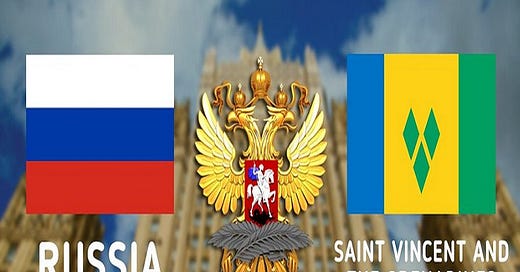Just like with Brazil, Russia’s officially de-ideologized relations with Latin America mean that it won’t let political differences on one issue (no matter how sensitive) impede the mutually beneficial comprehensive expansion of bilateral ties with St. Vincent & the Grenadines. That country’s worldview is aligned with Russia’s multipolar one and just as pragmatic with respect to the de-ideologization of bilateral ties otherwise Prime Minister Gonsalves wouldn’t have traveled to Venezuela to meet with Lavrov this week.
Russian Foreign Minister Lavrov’s latest trip to Latin America included a visit to Venezuela, at which time he also met the Bolivian Foreign Minister as well as the Prime Minister of St. Vincent & the Grenadines (SVG). The first made sense since his country has always abstained from voting against Russia at the UNGA or vetoed relevant resolutions, while the second requires more explanation since his country has always voted against Russia except when it came to expelling it from the Human Rights Council.
This tiny Caribbean nation of only around 100,000 people doesn’t usually come to mind when folks think about Russia’s Latin American partners, but those two cooperate through the multipolar “Group of Friends in Defense of the Charter of the United Nations” platform alongside over a dozen other states. Furthermore, SVG is part of the Venezuelan-based “Bolivarian Alliance for the Peoples of our America” (ALBA), in which it participates together with eight other regional countries.
Russian-SVG institutional cooperation through their shared UN platform and SVG’s close ties with Venezuela via ALBA therefore add crucial context to why Prime Minister Ralph Gonsalves decided to meet with Lavrov in Caracas. Their political differences over the NATO-Russian proxy war in Ukraine aside, which are the exact same as those between Brazil and Russia, they share similar visions regarding the ultimate outcome of the ongoing global systemic transition.
This is evidenced by the Russian Foreign Ministry’s press release, which reported that “The sides emphasised their principled rejection of the policy of unilateral sanctions, imposed in violation of the principles and norms of international law. They reaffirmed their commitment to establishing an international order that would hinge on genuine equality, as well as mutual consideration of and respect for the interests of states.”
Just like with Brazil, Russia’s officially de-ideologized relations with Latin America mean that it won’t let political differences on one issue (no matter how sensitive) impede the mutually beneficial comprehensive expansion of bilateral ties with SVG. That country’s worldview is aligned with Russia’s multipolar one and just as pragmatic with respect to the de-ideologization of bilateral ties otherwise Prime Minister Gonsalves wouldn’t have traveled to Venezuela to meet with Lavrov this week.
The optics of their meeting are immensely important because they show that the obvious asymmetry between these two countries in all regards isn’t an obstacle to comprehensively expanding their relations, nor are their political differences over the NATO-Russian proxy war in Ukraine. As was earlier observed, SVG votes the exact same way as Brazil does at the UNGA, yet neither let that get in the way of their leaders meeting with Russia’s top diplomat during his latest trip to Latin America.
The takeaway is that the US’ influence over Latin America is a shadow of its former self. That declining hegemon can’t even prevent Prime Minister Gonsalves from the tiny Caribbean nation of SVG from meeting with Lavrov in Venezuela, nor was it successful in coercing his country into sanctioning Russia either despite voting against it at the UNGA. It’s one thing for this policy to fail with Brazil and another entirely for it to fail with SVG since the latter shows the true limits of the US’ influence nowadays.





Different topic - what is your analysis of Under Secretary of State Nuland’s visit to Mongolia ? I have not followed Mongolia at all, and was surprised to see a country located between Russia and China hosting Nuland.